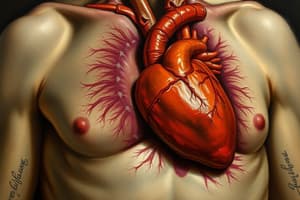Podcast
Questions and Answers
What symptom is associated with pleural effusion?
What symptom is associated with pleural effusion?
Which of the following symptoms suggests cardiac tamponade?
Which of the following symptoms suggests cardiac tamponade?
What sign is caused by pericarditis or pleural effusion?
What sign is caused by pericarditis or pleural effusion?
What characterizes pulsus paradoxus?
What characterizes pulsus paradoxus?
Signup and view all the answers
Which of the following conditions can lead to abdomen distension?
Which of the following conditions can lead to abdomen distension?
Signup and view all the answers
Which symptom is specifically associated with cardiac tamponade?
Which symptom is specifically associated with cardiac tamponade?
Signup and view all the answers
What condition is characterized by jugular venous distention during inspiration?
What condition is characterized by jugular venous distention during inspiration?
Signup and view all the answers
What physiological drop is defined as pulsus paradoxus?
What physiological drop is defined as pulsus paradoxus?
Signup and view all the answers
Which of the following does NOT contribute to pleural pericardial friction/rub?
Which of the following does NOT contribute to pleural pericardial friction/rub?
Signup and view all the answers
What combination of conditions can lead to both acites and pulsus paradoxus?
What combination of conditions can lead to both acites and pulsus paradoxus?
Signup and view all the answers
Which symptom is most closely associated with cardiac tamponade?
Which symptom is most closely associated with cardiac tamponade?
Signup and view all the answers
Which sign is characteristic of jugular venous distention during inspiration?
Which sign is characteristic of jugular venous distention during inspiration?
Signup and view all the answers
What does pulsus paradoxus indicate?
What does pulsus paradoxus indicate?
Signup and view all the answers
Which of the following conditions could contribute to pericardial friction rub?
Which of the following conditions could contribute to pericardial friction rub?
Signup and view all the answers
Acites is a potential complication of which conditions?
Acites is a potential complication of which conditions?
Signup and view all the answers
Which symptom is indicative of both anxiety and confusion in a patient?
Which symptom is indicative of both anxiety and confusion in a patient?
Signup and view all the answers
What does Kussmaul sign indicate during a respiratory event?
What does Kussmaul sign indicate during a respiratory event?
Signup and view all the answers
Which abnormality can be associated with both pericarditis and cardiac tamponade?
Which abnormality can be associated with both pericarditis and cardiac tamponade?
Signup and view all the answers
What psychological state can a patient experiencing cardiac tamponade exhibit?
What psychological state can a patient experiencing cardiac tamponade exhibit?
Signup and view all the answers
What is the definition of pulsus paradoxus?
What is the definition of pulsus paradoxus?
Signup and view all the answers
Study Notes
Pericardial/Pleural Effusion/Cardiac Tamponade
- Syncope, anxiety, and confusion are symptoms of pleural effusion
- Restlessness and a sense of doom are indicators of cardiac tamponade
- Pericarditis/pleural effusion/cardiac tamponade can be caused by pericardial friction rub
- Pericarditis/pleural effusion/cardiac tamponade cause what signs? Kussmal sign—jugular venous distention with inspiration
- Fluid and pulse abnormalities are caused by pericarditis/pleural effusion and cardiac tamponade, including ascites and pulsus paradoxus
- Pulsus paradoxus is a decrease in pulse by 10mmHg during inspiration.
Studying That Suits You
Use AI to generate personalized quizzes and flashcards to suit your learning preferences.
Related Documents
Description
Test your knowledge on pericardial effusion, pleural effusion, and cardiac tamponade. This quiz covers symptoms, signs such as Kussmaul sign, and key concepts like pulsus paradoxus. Enhance your understanding of these critical cardiac conditions.



